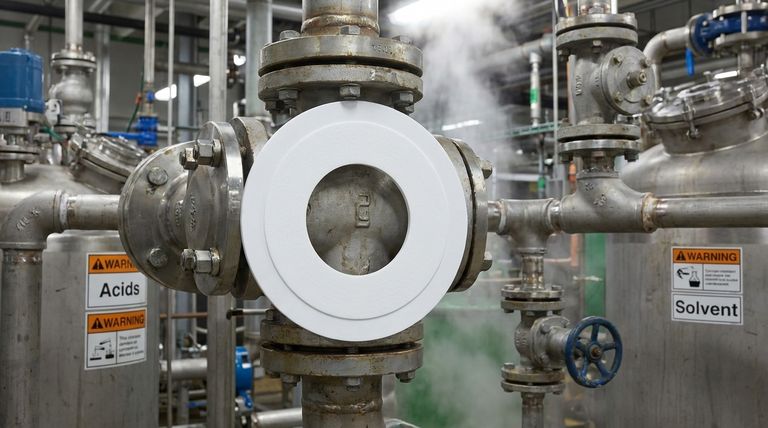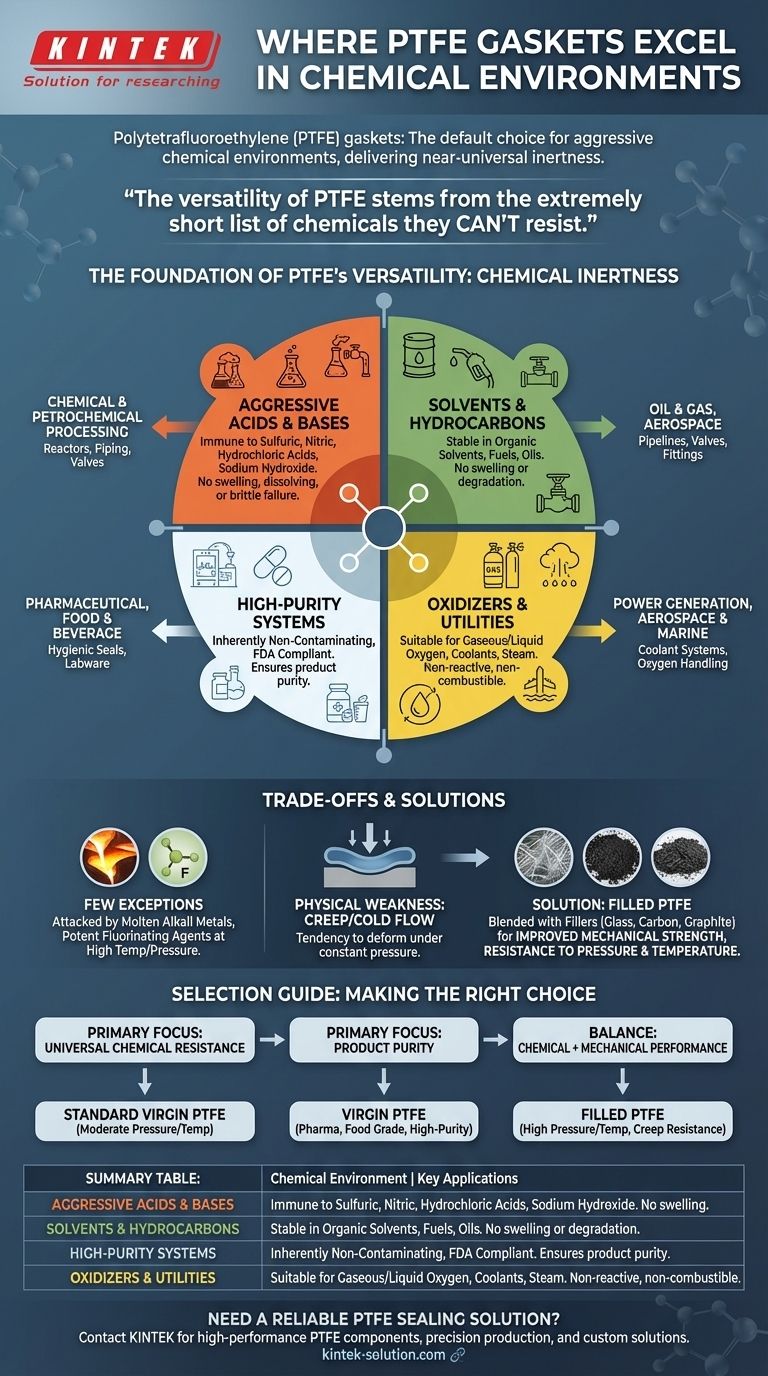In short, Polytetrafluoroethylene (PTFE) gaskets are the default choice for the most aggressive chemical environments found in modern industry. Their primary application is in sealing systems that handle highly corrosive acids, bases (alkalis), solvents, and oxidizers, where nearly any other material would degrade and fail.
The versatility of PTFE gaskets stems not from a long list of chemicals they can resist, but from the extremely short list of chemicals they can't. This near-universal chemical inertness makes PTFE the benchmark material for ensuring seal integrity and preventing contamination in critical applications.
The Foundation of PTFE's Versatility: Chemical Inertness
The unique properties of PTFE are rooted in its molecular structure—a strong carbon-fluorine bond. This bond is exceptionally stable and non-reactive, giving the material its signature characteristics.
Resistance to Aggressive Acids and Bases
PTFE is virtually immune to attack from the most potent acids and bases used in industrial processes. This includes chemicals like concentrated sulfuric acid, nitric acid, hydrochloric acid, and sodium hydroxide.
Where other sealing materials would swell, dissolve, or become brittle, PTFE maintains its structural integrity and sealing capability.
Stability in Solvents and Hydrocarbons
PTFE gaskets exhibit no swelling or degradation when exposed to a vast range of organic solvents, fuels, oils, and other hydrocarbons.
This makes them essential in the petrochemical, oil and gas, and aerospace industries for sealing pipelines, valves, and fittings that transport these media.
Purity in Sensitive Environments
Beyond just resistance, PTFE is valued for its purity. It is an inherently non-contaminating material, meaning it does not leach chemicals into the media it is sealing.
This property is non-negotiable in industries like pharmaceuticals, food and beverage, and semiconductors, where preventing process contamination is paramount for product safety and quality.
Key Industrial Applications Driven by Chemical Properties
The chemical resilience of PTFE makes it a foundational component across numerous sectors. Its role is to provide a reliable seal where failure is not an option.
Chemical and Petrochemical Processing
This is the classic use case for PTFE. It is used to seal flanges, pumps, valves, and reactor vessels containing everything from raw chemical feedstocks to finished corrosive products.
Pharmaceutical and Food & Beverage
In these industries, hygiene and purity are as important as chemical resistance. PTFE's inert, non-toxic, and non-absorbent surface meets strict regulatory standards (like FDA compliance), ensuring the product remains pure.
Power Generation and Utilities
PTFE gaskets are used in systems handling corrosive coolants, water treatment chemicals, and high-purity steam. They are also one of the few materials suitable for sealing systems with gaseous or liquid oxygen, as they will not react or combust.
Aerospace and Marine
In these environments, PTFE provides a reliable seal against aggressive hydraulic fluids, aviation fuels, and the corrosive effects of saltwater. Its use as an electrical insulator in wiring also stems from its chemical non-reactivity.
Understanding the Trade-offs and Limitations
While chemically superior, no material is perfect for every situation. Understanding PTFE's limitations is key to using it effectively.
The Few Chemical Exceptions
PTFE's legendary chemical resistance has a few known exceptions. It can be attacked by molten alkali metals (like sodium), and potent fluorinating agents (like chlorine trifluoride) at high temperatures and pressures. These are highly specialized conditions and rarely encountered in typical industrial processes.
Physical vs. Chemical Weaknesses
The primary trade-off with PTFE is mechanical, not chemical. Virgin PTFE is a relatively soft material and can be susceptible to creep, also known as cold flow. This is the tendency for the material to deform over time under constant pressure, which can lead to a loss of seal tightness.
The Role of Fillers
To counteract mechanical weaknesses like creep, PTFE is often blended with fillers such as glass, carbon, or graphite. These "filled PTFE" gaskets offer significantly improved mechanical strength and resistance to high pressures and temperatures, while retaining excellent chemical resistance for most applications.
Making the Right Choice for Your Application
Selecting the right gasket requires matching the material's properties to your operational goal.
- If your primary focus is universal chemical resistance: Standard virgin PTFE is the go-to choice for sealing aggressive acids, bases, and solvents where pressures and temperatures are moderate.
- If your primary focus is product purity: Virgin PTFE is the only choice for pharmaceutical, food grade, or high-purity applications to prevent any possibility of contamination.
- If you need to balance chemical resistance with mechanical performance: A filled PTFE gasket is the superior option for high-pressure or high-temperature systems where creep resistance is critical.
Ultimately, PTFE's role as a sealing material is defined by its ability to remain stable and reliable in environments that cause other materials to fail.

Summary Table:
| Chemical Environment | Key PTFE Gasket Applications |
|---|---|
| Aggressive Acids & Bases | Reactor vessels, piping, and valves in chemical processing. |
| Solvents & Hydrocarbons | Seals for pipelines and fittings in petrochemical and oil & gas. |
| High-Purity Systems | Pharmaceutical, food & beverage, and semiconductor manufacturing. |
| Oxidizers & Utilities | Systems handling oxygen, coolants, and water treatment chemicals. |
Need a reliable PTFE sealing solution for your demanding chemical environment?
At KINTEK, we specialize in manufacturing high-performance PTFE components—including seals, gaskets, liners, and custom labware—for the semiconductor, medical, laboratory, and industrial sectors. Our precision production and custom fabrication services, from prototypes to high-volume orders, ensure you get a seal that guarantees integrity and prevents contamination.
Contact us today to discuss your specific requirements and let our experts provide a tailored PTFE solution for your critical application.
Visual Guide

Related Products
- Custom PTFE Parts Manufacturer for Teflon Parts and PTFE Tweezers
- Custom PTFE Parts Manufacturer for Teflon Containers and Components
- Customizable PTFE Seals Filter Holders for Versatile Applications
- Custom PTFE Measuring Cylinders for Advanced Scientific and Industrial Applications
- Custom PTFE Square Trays for Industrial and Laboratory Use
People Also Ask
- What challenges arise when machining PTFE (Teflon)? Overcome Softness, Heat, and Instability
- What fabrication services are available for PTFE? Shearing, Stamping, Laser Cutting, Molding & Machining
- What are the unique properties of PTFE? Unlock Unmatched Performance in Demanding Applications
- What design considerations are important for custom PTFE parts? Design for Performance & Reliability
- What factors should be considered when choosing between Nylon and PTFE? Select the Right Material for Your Application



















